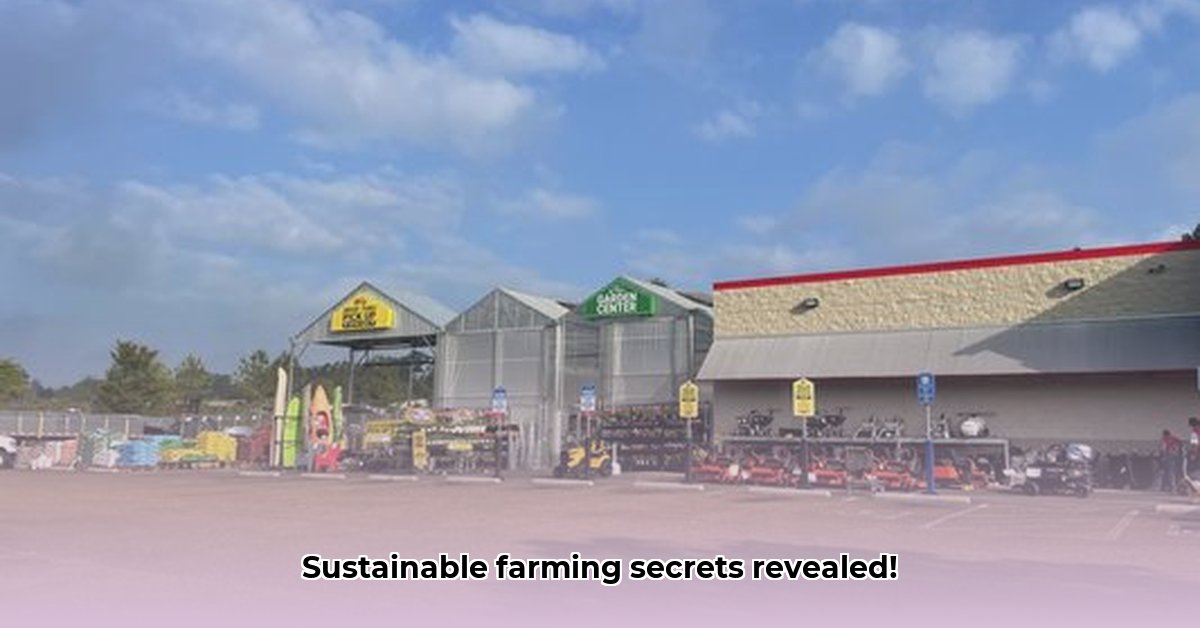
Tractor Supply Co. McComb, Mississippi: A Local Hub for Sustainable Agriculture?
Tractor Supply Company (TSC) in McComb, Mississippi, holds significant potential for fostering sustainable agriculture within the community. This article examines TSC's current offerings, assesses its sustainability initiatives (or lack thereof), and provides actionable steps for all stakeholders to cultivate a greener future. We'll explore how the everyday choices made at TSC can ripple outward, impacting the entire agricultural ecosystem of McComb. For more information on the McComb store, visit TSC McComb.
What TSC McComb Offers for Sustainable Farming Practices
TSC McComb offers a range of products relevant to sustainable agriculture, including organic seeds, various gardening tools, and livestock feed options. However, a critical assessment reveals gaps in the current selection. While organic seeds provide a foundation for chemical-free farming, options for organic fertilizers and pest control solutions appear limited. Similarly, the availability of sustainably sourced materials for tools and animal feed may need expansion. This presents an opportunity for TSC to further enhance its contribution to sustainable practices. Images depicting available organic seeds and water-efficient watering systems would further illustrate these points.
TSC McComb's Sustainability: Transparency and Opportunities
Currently, readily available data regarding TSC McComb's own sustainability efforts is scant. Information on sourcing practices (where their products originate), waste management strategies, and ethical labor practices within their supply chain is lacking. This lack of transparency hinders a complete evaluation of their current environmental and social footprint. This, however, doesn't negate the store's potential to become a significant driver of sustainable agriculture in McComb. Increased transparency is crucial for building trust with customers and fostering genuine commitment to sustainability.
Actionable Steps for a Greener McComb: A Collaborative Approach
To maximize TSC McComb's positive impact on sustainable agriculture, a multi-pronged approach is necessary. Here's a breakdown of actionable steps for key stakeholders:
For TSC McComb Management:
Short-Term (1 Year): Conduct a thorough sales data analysis to identify high-demand sustainable products and areas requiring expansion. Invest in employee training programs focused on sustainable agriculture practices. Implement a basic in-store recycling program.
Long-Term (3-5 Years): Significantly expand the product range to include a broader selection of certified organic fertilizers, sustainable pest control solutions, and water conservation tools. Establish partnerships with local farmers and sustainable agriculture organizations, co-hosting workshops and educational events. Publish an annual sustainability report detailing sourcing practices, waste management strategies, and environmental goals.
For Local Farmers:
Short-Term: Carefully examine TSC's product offerings, identifying any gaps in their sustainable supply inventory. Explore bulk purchasing options with TSC to reduce costs for frequently purchased products.
Long-Term: Collaborate with TSC to co-create marketing initiatives that promote local, sustainable agriculture. Share best practices and participate in community workshops to expand awareness.
For Local Government:
Short-Term: Monitor TSC McComb's waste management practices and ensure compliance with environmental regulations.
Long-Term: Develop and implement local ordinances or incentives that support the adoption of sustainable farming techniques, utilizing TSC as a key distribution partner.
For Consumers:
Short-Term: Prioritize purchasing sustainable products from TSC McComb whenever possible. Actively engage TSC staff, asking questions about product sourcing and sustainability.
Long-Term: Directly communicate to TSC McComb management any desired sustainable products not currently stocked. Support local farmers and participate in community-led initiatives promoting sustainable agriculture.
Addressing Challenges and Risks in the Pursuit of Sustainability
Achieving sustainable agriculture is not without its difficulties. Several factors can hinder progress:
Low consumer demand: Limited initial demand may discourage TSC from investing in a wider range of sustainable products. Mitigation: Targeted marketing campaigns highlighting the benefits of sustainable farming practices can address this.
Supply chain disruptions: Sourcing sustainable materials can present logistical challenges. Mitigation: Diversifying suppliers and developing strong relationships with reliable providers are crucial.
Staff knowledge gaps: Inadequate employee understanding of sustainable agriculture may hamper effective customer service. Mitigation: Comprehensive staff training and access to educational resources are essential.
Competition: Other retailers may offer comparable products, potentially overshadowing TSC’s sustainable offerings. Mitigation: TSC must differentiate itself. This can be accomplished through unique value propositions such as community partnerships and educational workshops.
Regulatory implications: Compliance with environmental protection regulations and pesticide safety guidelines is critical. Mitigation: Continuous monitoring and adaptation are essential.
Conclusion: Cultivating a Sustainable Future Together
TSC McComb possesses remarkable potential to significantly enhance sustainable agriculture in the local community. However, realizing this potential requires a collaborative effort involving TSC management, local farmers, the local government, and consumers. By addressing the identified gaps in product offerings, improving transparency surrounding sourcing and waste management practices, and proactively engaging with the community, TSC can become a powerful catalyst for a greener, more sustainable McComb. Let's work together to build a thriving agricultural ecosystem that benefits both our community and the environment.